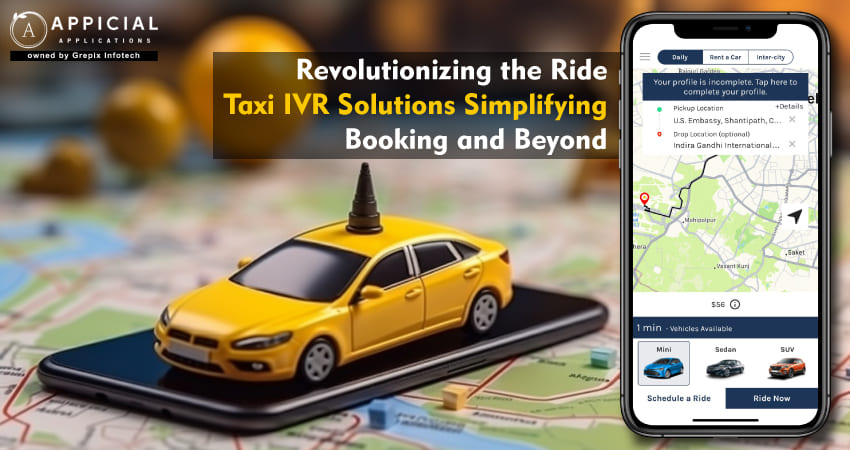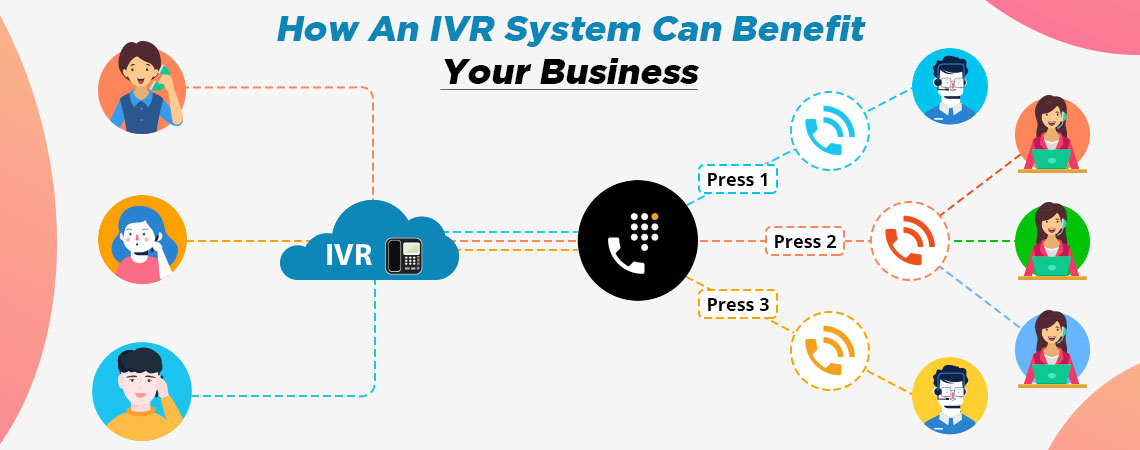
Revolutionizing the Ride: Taxi IVR Solutions Simplifying Booking And Beyond
Are you looking to find ways to outcompete other taxi companies and grow your business? The secret to reaching this objective is raising the caliber of your customer support. Using interactive voice response (IVR) technology is one efficient method to accomplish this. We'll look at how taxi IVR systems can increase revenue, enhance customer satisfaction, and propel business growth.
Why IVR Solutions is Important in the Taxi Industry
- According to the most recent data, the global drone package delivery market is projected to grow at a compound annual growth rate (CAGR) of roughly 47.8% to reach approximately $7168.8 million by 2030.
- With a 54% compound annual growth rate, the Fortune Business Insights report projects that the global drone delivery market will reach approximately $31 billion by 2028.
- According to Marketwatch.com's research, drone distribution delivery will reach a global market cap of $11 billion by 2027, growing at a compound annual growth rate of 54%.
- According to projections from Gartner, one million or even more drones could be used to assist with retail deliveries by 2026.
- By 2021 and 2026, when the forecast period ends, this amount should increase to $3.47 billion.
- Allied Market Research projects that the drone package delivery industry will grow to a value of approximately $32.1 billion.
- It is anticipated that the drone delivery market will grow to a size of approximately $1.47 billion globally.
Explore the world of Taxi Interactive Voice Response (IVR) solutions and how they simplify the booking process and beyond. This blog post delves into the role of IVR technology in enhancing the user experience, optimizing operations, and providing a seamless ride-hailing service. Whether you're a taxi app operator or a user looking for a convenient booking experience, this guide sheds light on the benefits of incorporating IVR solutions in the taxi industry.
If you own a taxi company, you are surely aware of the challenges involved in scheduling drivers, managing a fleet of taxis, and meeting the various needs of your customers. The very initial point of reach is one of the main areas where you and your riders disagree. Booking a ride usually requires a phone call, which can be inconvenient, time-consuming, and prone to mistakes.
Installing a taxi IVR system , which automates the booking procedure and simplifies communication, is the solution to this issue. Without the assistance of a human operator, users can book rides, get trip updates, and leave feedback via an IVR system. This gives your passengers a more smooth and customized experience while also saving time and decreasing errors.
Developing an Interactive Voice Response (IVR) system for a taxi booking app can enhance user experience and streamline the booking process. Here are the key steps and considerations for developing a taxi app booking IVR system:

Define Objectives
Start by defining the objectives of the IVR system. In the context of a taxi booking app, the main goal is to facilitate easy and efficient booking for users. Identify specific use cases, such as booking a ride, checking ride status, or managing reservations.
The drones pick up and deliver orders to customers using the vertical takeoff and landing (VTOL) method.
Technology Stack
Choose the technology stack for your IVR system. You'll need telephony infrastructure and software to build and deploy your IVR. Common technologies include VoiceXML, Twilio, and other cloud-based telephony services.
User Interface Design
Design a user-friendly and intuitive IVR menu. Keep it simple and easy to navigate, as users should be able to book a ride or access information quickly. Use voice prompts and DTMF (Dual-Tone Multi-Frequency) input for user interaction.
Integration With Taxi App
Ensure seamless integration with your taxi booking app. The IVR system should connect to the app's database to access user profiles, booking details, and driver availability. You may need APIs or webhooks to facilitate this integration.
Features And Functionality
Consider the features and functionality of your IVR system, such as:
- Booking a ride by specifying pickup and drop-off locations.
- Checking the status of an existing booking.
- Canceling or modifying a reservation.
- Providing fare estimates.
- Registering user accounts and profiles.
- Offering multilingual support for a diverse user base.

Natural Language Processing (NLP)
Implement Natural Language Processing capabilities to make the system more conversational and user-friendly. Users should be able to speak naturally, and the IVR system should understand and respond appropriately.
Call Routing and Handling
Implement call routing based on user inputs. For example, if a user wants to book a ride, the IVR system should route the call to the appropriate module for booking.
Payment Integration
If users can pay through the IVR system, integrate payment gateways securely. Ensure compliance with payment regulations and data security.
Testing and Quality Assurance
Thoroughly test the IVR system to ensure it works as intended. Test different scenarios, including user errors, to provide a seamless experience.
Voice Talent and Recordings
Hire a professional voice actor to record voice prompts and menu options. Ensure clarity and natural flow in the voice recordings.
Compliance and Security
Ensure that your IVR system complies with relevant regulations, such as privacy and data protection laws. Implement security measures to protect user data.
Scalability
Design the IVR system to be scalable, as your user base may grow over time. Ensure it can handle a high volume of calls and bookings.
Customer Support
Provide a way for users to reach a live support agent if they encounter issues or prefer human assistance.
Monitoring and Analytics
Implement tools to monitor the performance of the IVR system. Analyze call data to identify areas for improvement and user behavior patterns.
Continuous Improvement
Continuously gather user feedback and make improvements to the IVR system based on user input and evolving user needs.
The Benefits Of Taxi IVR Solutions in Taxi Businesses
In today's fast-paced world, taxi businesses are constantly seeking ways to enhance the customer experience and streamline their operations. One innovative solution that has gained popularity in the taxi industry is the implementation of Interactive Voice Response (IVR) systems. These automated phone systems are designed to facilitate efficient communication between customers and taxi services. If you're still on the fence about whether to invest in an IVR solution for your taxi business, here are some compelling benefits to consider:
1. Improved Customer Satisfaction
IVR systems enable customers to book rides or access information 24/7. This Customer Satisfaction is a game-changer, as it allows customers to book a ride at any time, even during off-hours when your customer service agents may not be available.
2. Faster Booking Process
With IVR solutions, customers can book a ride in a matter of minutes. They can simply follow the automated prompts to specify their pickup and drop-off locations and receive an estimated arrival time for their taxi.
3. Reduced Human Error
Using an IVR system minimizes the risk of human error when booking a taxi. Customers can input their information directly, reducing the likelihood of misunderstandings or miscommunication that can occur during a phone conversation with a dispatcher.
4. Efficient Call Handling
For taxi businesses, efficiently handling a high volume of incoming calls is crucial. IVR systems help route calls to the right department or agent based on the customer's request, eliminating the need for manual call routing and reducing hold times.
5. Cost Savings
Implementing an IVR system can lead to significant cost savings in the long run. You can reduce the number of customer service agents required during non-peak hours, and this automation can help your business run more efficiently.
6. Enhanced Customer Experience
IVR systems can be designed to provide a personalized and professional experience for your customers. You can use voice prompts, hold music, and other elements to create a positive impression of your taxi service.
7. Data Collection and Analysis
IVR systems can collect data about customer bookings and preferences, which can be invaluable for improving your services. Analyzing this data can help you make informed decisions about routes, pricing, and other aspects of your taxi business.
8. Scalability
As your taxi business grows, an IVR system can easily scale with it. You can adapt and expand your IVR system to meet the increasing demand for your services.
9. Multilingual Support
If your taxi service serves a diverse community, IVR solutions can be programmed to offer support in multiple languages, ensuring that all customers can access your services comfortably.
10. Increased Competitiveness Embracing
IVR technology demonstrates your commitment to staying at the forefront of the industry. It can give your taxi business a competitive edge and attract tech-savvy customers.
Top 10 Taxi IVR Solutions Providing Companies
1. Twilio
Twilio is a cloud communications platform that offers IVR capabilities and APIs to build custom IVR solutions for taxi services.
2. Plivo
Plivo provides voice and messaging services, including IVR capabilities, which can be used for building a taxi IVR system.
3. Nexmo (now Vonage)
Nexmo, a Vonage Company, offers communication APIs, including IVR, that can be integrated into taxi applications.
4. Asterisk
An open-source PBX (Private Branch Exchange) software, Asterisk can be used to build custom IVR systems for taxi services.
5. Tropo
Tropo, now part of Cisco, provides cloud API platforms for voice and messaging, suitable for developing IVR solutions.
6. DialogTech
DialogTech offers IVR and call-tracking solutions that can be applied to the taxi industry.
7. Exelysis
Exelysis is a company that provides IVR and CTI (Computer Telephony Integration) solutions for taxi services and call centers.
8. Appicial Applications
Appicial Applications is a trusted company that provides cutting-edge IVR (Interactive Voice Response) solutions. They specialize in designing and delivering state-of-the-art IVR systems that revolutionize their customer interactions. They provide streamlined communication, enhanced efficiency, and 24/7 accessibility for their customers.
9. Plum Voice
Plum Voice offers cloud-based IVR solutions that can be integrated into taxi booking and dispatch systems.
10. Zaplee
Zaplee offers call center and IVR solutions that can be customized for use in the taxi and transportation sectors.
Conclusion
IVR solutions are a powerful tool that can benefit your taxi business in numerous ways. By providing 24/7 accessibility, streamlining bookings, and enhancing the overall customer experience, IVR systems can help you stand out in a competitive market while improving operational efficiency and reducing costs. As the taxi industry evolves, embracing this technology can be a key driver of success for your business. With Appicial Applications, you'll unlock the power of automation, ensuring a seamless and satisfying experience for your callers. Join us in shaping the future of customer service through innovative IVR solutions.





